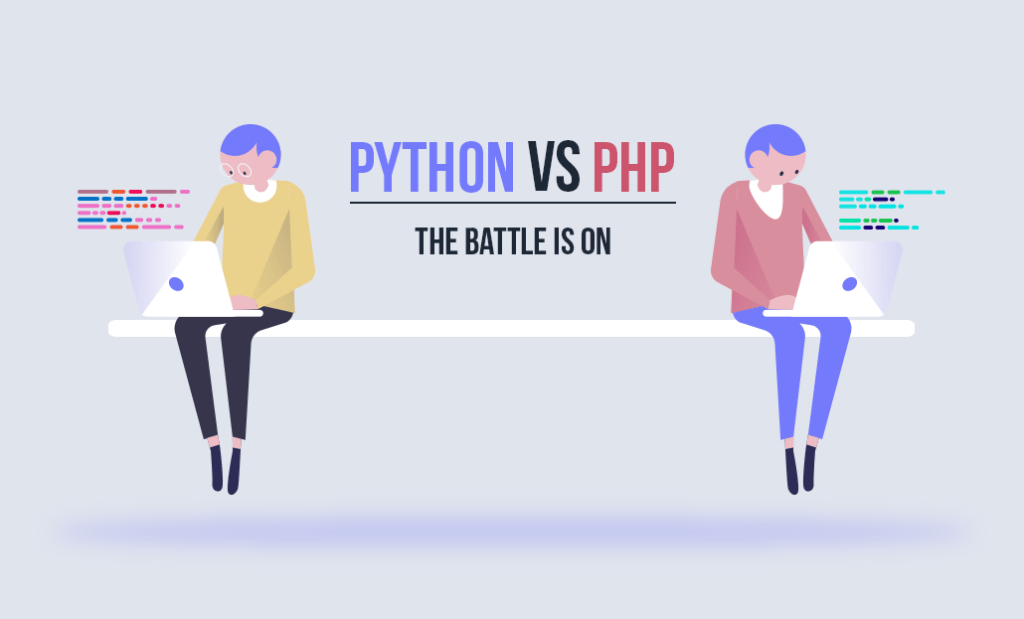
It is crucial to choose the right programming language for your development project. For website development projects, most businesses prefer to use PHP and Python.
It can be difficult to choose between these two languages when compared. While many websites are built in PHP, Python has become very popular over the past few years.
Which programming language is best for your web application – PHP or Python? This blog post will explain the differences between the languages and then compare them. So, let’s get started!
What is Python?
Python is an open-source programming language. It aims to promote object-oriented programming concepts. This language was created by Guido Van Rossum in 1991. It is currently one of the most widely used languages. It provides a high-level, simple-to-understand syntax.
According to Stack Overflow Survey 2021, Python is the most loved and desired language. Many companies use Python to develop their apps. It is a web browser scripting language that you can use to develop web apps.
What is PHP?
The programming language PHP, or Hypertext Preprocessor, is an excellent choice for website developers. It is an open-source scripting language for server scripting. It can be used to create engaging and user-driven websites. PHP is the best language choice with many outstanding features, plugins, and libraries. These add-ons will maximize community support and functionalities.
In 1995, Rasmus Lerdorf created PHP (Personal Home Page). It was renamed PHP-Hypertext Processor in 1995. It is supported by almost all web browsers and can be used to develop backend web apps.
PHP is used to power almost all websites on the internet. It is a flexible, pragmatic, and fast language that can handle dynamic content on HTML websites as well as session tracking and databases.
Python Features
- Python can be run on different hardware platforms with the same user interface.
- It’s easy to understand, learn and maintain.
- It offers a great structure and support for large programs.
- It is easy to include low-level modules in the Python interpreter.
- Python supports automatic garbage collection.
- It is possible to integrate Python with C++, C++, or Java programming code.
- Python supports dynamic type checking and high-level dynamic data types.
- It allows for interactive testing and debugging.
PHP Features
- PHP is much easier to use and code than other programming languages.
- It supports various databases such as Oracle and MySQL, and thus allows for database integration.
- PHP allows you to log in by making an overview of all user accesses.
- PHP is faster than other scripting languages such as JSP or ASP.
- It has a few predefined errors reporting constants, which create an error warning or notice.
- PHP is an open-source programming language. You can download it and use it free of charge.
- Python’s Pros and Cones
- These are the pros and cons of using Python programming language in website development.
Python’s Pros
- It is a general-purpose, object-oriented language that can be used in many fields.
- Features cross-platform code reusability
- It is easy to use, read, understand, and maintain.
- Automatic garbage collection
- Develops GUI apps
- It can be integrated with other programming languages such as Java and C++.
- Libraries like Tensorflow are available for math-intensive tasks
- A universally interpreted, open-source language
- High-quality graphics that are highly graphic and make amateurs happy
- Its WORA functionality allows it to be portable
Cons of Python
- Mobile computing, mobile browsers, and mobile application development are not very useful.
- It has a huge amount of memory to make it easy for developers.
- It works slower than other languages for website development
- Recurrent delays in testing web apps
- Dynamic typing makes error detection difficult
- Gigantic is a small and simple app or website.
- Duck-typing causes run-time errors
- A bit simpler for some specific tasks
The pros and cons of PHP
Here are the top advantages and disadvantages of PHP for web app development.
Pros of PHP
- High-quality debugging
- Many pluggable frameworks. Open-source and object-oriented.
- Features a large ecosystem
- Supports other database interfaces such as PostgreSQL and No SQL
- Support is available for multiple operating systems and can be used cross-platform
- Supports database collection modules
- Flexible and platform-independent
- PHP-based apps are compatible with all operating systems, including Windows, Linux, and UNIX.
- SQL Support Features
- There are many open-source PHP frameworks that you can use free of charge.
Cons of PHP
- Performance was wired and impeded
- It is impossible to change its core behavior.
- Poor typing can result in incorrect knowledge and data being given to users
- Content-based apps may not be suitable
- There is no IOT alliance
- Inadequacy in security features and protocols
What is the best time to choose Python?
Python programming language is becoming more popular. Here are some reasons to choose Python.
- Django Framework for building websites
- Seeking deep data analytics
- Working in areas such as data science and robotics
What is the best time to choose PHP?
PHP is a very popular language for server-side scripting. These are just a few examples of situations where PHP can be used:
- Investments are less
- Web applications and blogs development
- Effectively working on the server-side
Why choose Python?
Python has many benefits, making it a popular technology. Here are some reasons Python is the best choice for web development.
- Python automates code and handles garbage collection and memory addresses.
- Python syntax is easy to understand and simple to debug. Its source code is therefore easier to maintain.
- Python website development can be made easy by using a variety of pre-built libraries.
- Python provides a framework that allows you to create GUI apps. For instance, Django, WXPython, Tkinter, etc.
- Python is a portable, versatile language that can be used on multiple operating systems and platforms.
- Python is a database-friendly language that allows you to store large amounts of data. necessary commercial DBMS systems.
- Python’s interactive shell allows you to test your code before you implement it.
Why choose PHP?
PHP is a powerful programming language. Here are some reasons why PHP should be chosen.
- It is free and open-source.
- It is a scripting language that can be used on many platforms, including Mac OS X and Linux.
- PHP is compatible with all servers, including IIS, Apaches, and others.
- It’s easy to use and it works well on the server side.
- PHP can be used with a variety of databases.
Comparison of PHP and Python
This gives you a complete overview of each language, including its features, pros, and cons. Here’s a PHP-to-Python comparison that uses different parameters.
You can compare the various languages to determine which one is best for you, as well as how efficient and easy it is to use. This will allow you to make the best decision for your web development efforts.
Let’s get into a cold war between PHP and Python!
1. Community Support
Both PHP and Python offer excellent community support. PHP is a well-known web app development tool that has a long history. Many developers can offer immediate support.
This is where Python and PHP match up closely. The community support for Python is great because many Python developers continue to build Python apps. There is no clear winner.
2. Flexibility
Machine Learning-powered web apps are highly in demand. ML is also a key feature of Python. Python has excellent machine learning libraries such as Pandas and Tensorflow, Theano, and Scikit-learn. These libraries are fast, robust, unique, and can seamlessly work with a web framework.
Keep in mind that Python can be useful in many fields, not just website development. PHP, however, is only relevant when it comes to web design. This is why Python has a higher score than PHP.
3. It’s easy to use
Python is an open-source programming language that can be used anywhere. Programming in Python is easy, too. Python programming is much easier than PHP.
PHP isn’t a standard programming language. It’s only used to create dynamic web pages using HTML. This makes PHP less productive than Python. In terms of ease of use, PHP wins over Python.
4. Speed to Market
Python has a wide range of third-party packages, libraries, and modules that can be used to speed up a project’s completion. Django, for example, is a popular Python web framework. It uses the MVC pattern to allow developers to quickly build apps using great division and reusability.
PHP has its own set of tools. These include incorporating frameworks, libraries, and other tools. Laravel, for example, is the most well-known PHP framework. It accepts the MVC design and comes prepackaged with many useful features such as routing, authentication, templating, and so on.
5. Web Frameworks
Both PHP and Python offer powerful website development tools that are well-designed. PHP’s web frameworks are used by many large companies. Symfony, Laravel, and other mature frameworks are supported by a large community. PHP makes web development simple.
Many other frameworks are also available in Python. Flask and Django are the most well-known Python-based web frameworks. These frameworks are extremely scalable, secure, fast, and easy to use. Django is preferred by developers over PHP-based frameworks due to its ease of setup and shorter development time.
6. Library Management
Pip is used by Python to deal with packages. Pip ensures that Python app development can be quick and easy while meeting all development requirements.
PHP’s library management is less powerful than Python’s. Python offers a wider range of packages and more useful tools to make web app development easier. Python is the winner in this category.
7. Security
Python is the preferred choice for businesses in terms of security. Django, for example, has many security features built in that protect the apps against different security threats. Different government agencies also depend on Python for secret hacking.
Despite its strong community support, PHP is still less secure than Python. At this point, PHP wins over Python.
8. Environment Management
Python is the most versatile programming language in terms of managing environments. Virtualenv allows you to install multiple versions of Python and then move between them instantly.
In this area, PHP can’t compete with Python. VirtPHP is an analog to PHP but it’s not maintained and archived. Developers love containers when using PHP. This is why Python is the clear winner.
9. Learning is easy
Python is much easier to learn. This general-purpose programming language is easy to learn. It’s easy to find a beginner programming course. Python programs are simpler and easier to write than other languages.
PHP, on the other hand, is designed for web apps and not standalone programs. PHP is not an all-purpose language. It takes longer to learn PHP than Python.
10. Debugging
PDB, or Python Debugger, is an inbuilt debugger for Python. There are many ways to debug it. PDB allows developers to work seamlessly without having to announce things at the start of programs.
PHP provides an XDebug package that addresses bugs and errors, as well as code-checking for developers. PHP development is slower at detecting and fixing bugs. It is therefore susceptible to security issues.
Conclusion Thoughts
Both PHP and Python are great at website development. However, Python is superior in many areas. This does not mean that you should choose Python over PHP. Both PHP and Python can be used to develop web apps.
It all depends on what your project requires, as well as your PHP and Python knowledge, skills, and expertise when building web apps.


